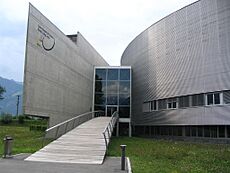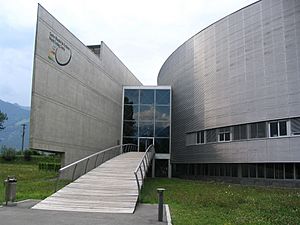Union Cycliste Internationale facts for kids

Headquarters
|
|
| Abbreviation | UCI |
|---|---|
| Formation | 14 April 1900 |
| Founded at | Paris, France |
| Type | Sports federation |
| Headquarters | Aigle, Switzerland |
|
Region served
|
Worldwide |
|
President
|
David Lappartient |
|
Main organ
|
Congress |
| Affiliations | International Olympic Committee |
The Union Cycliste Internationale (UCI; French pronunciation: [ynjɔ̃ siklist ɛ̃tɛʁnasjɔnal]; English: International Cycling Union) is the world governing body for sports cycling and oversees international competitive cycling events. The UCI is based in Aigle, Switzerland.
The UCI issues racing licenses to riders and enforces disciplinary rules, such as in matters of doping. The UCI also manages the classification of races and the points ranking system in various cycling disciplines including road and track cycling, mountain biking and BMX, for both men and women, amateur and professional. It also oversees the World Championships.
After the 2022 Russian invasion of Ukraine, the UCI said that Russian and Belarusian teams were forbidden from competing in international events. It also stripped both Russia and Belarus of scheduled events.
Contents
History
UCI was founded in 1900 in Paris by the national cycling sports organisations of Belgium, the United States, France, Italy, and Switzerland. It replaced the International Cycling Association (ICA) by setting up in opposition in a row over whether Great Britain should be allowed just one team at the world Championships or separate teams representing England, Ireland, Scotland and Wales. Britain found itself outflanked, and it was not able to join the UCI – under the conditions the UCI had imposed – until 1903.
There were originally 30 countries affiliated to the union. They did not have equal voting power and some had no vote at all. Votes were distributed by the number of tracks, or velodromes, that each nation claimed. France had 18 votes, the highest number, and Germany and Italy 14 each. Britain had eight, a number the writer Bill Mills said was acquired "by including many rather doubtful grass tracks."
In 1965, under the pressure of the IOC (the Olympics was then an amateur event), the UCI created two subsidiary bodies, the International Amateur Cycling Federation (Fédération Internationale Amateur de Cyclisme or FIAC) and the International Professional Cycling Federation (Fédération Internationale de Cyclisme Professionnel or FICP). The UCI assumed a role coordinating both bodies.
The FIAC was based in Rome, the FICP in Luxembourg, and the UCI in Geneva.
The FIAC was the bigger of the two organisations, with 127 member federations across all five continents. It was dominated by the countries of the Eastern Bloc which were amateur. The FIAC arranged representation of cycling at the Olympic Games, and FIAC cyclists competed against FICP members on only rare occasions. In 1992, the UCI reunified the FIAC and FICP, and merged them back into the UCI. The combined organisation then relocated to Aigle, close to the IOC in Lausanne.
In 2004, the UCI constructed a 200-metre velodrome at the new World Cycling Centre adjacent to its headquarters.
In September 2007 the UCI announced that it had decided to award ProTour status for the first time ever to an event outside of Europe; the Tour Down Under in Adelaide, Australia. The announcement followed negotiations between UCI President Pat McQuaid and South Australian Premier Mike Rann.
In 2013 Tracey Gaudry became the first woman appointed as vice president of the UCI.
After the 2022 Russian invasion of Ukraine, the UCI said that Russian and Belarusian teams are forbidden from competing in international events. It also stripped both Russia and Belarus of scheduled events.
World championships
The UCI organises cycling's world championships, administration of which it gives to member nations. The first championships were on the road and on the track. They were allocated originally to member nations in turn, on condition the country was deemed competent and that it could guarantee ticket sales. A nation given a championship or series of championships was required to pay the UCI 30 per cent of ticket receipts from the track and 10 per cent from the road. Of this, the UCI kept 30 per cent and gave the rest to competing nations in proportion to the number of events in which it competed. The highest gate money in this pre-war era was 600 000 francs in Paris in 1903.
There were originally five championships: amateur and professional sprint, amateur and professional road race, and professional Motor-paced racing. The road race was traditionally a massed start but did not have to be: Britain organised its road championship before the war as a time trial, the National Cyclists Union believing it best to run races against the clock, and without publicity before the start, to avoid police attention. Continental European organisers generally preferred massed races on circuits, fenced throughout or along the finish to charge for entry.
Records
The original records were on the track: unpaced, human-paced and mechanically paced. They were promoted for three classes of bicycle: solos, tandems and unusual machines such as what are now known as recumbents, on which the rider lies horizontal. Distances were imperial and metric, from 440 yards and 500 metres to 24 hours. The UCI banned recumbents in competitions and in record attempts on 1 April 1934. Later changes included restrictions on riding positions of the sort that affected Graeme Obree in the 1990s and the banning in 2000 of all frames that did not have a seat tube.
Rainbow jersey
The winner of a UCI World Championship title is awarded a rainbow jersey, white with five coloured bands on the chest. This jersey can be worn in only the discipline, specialty and category of competition in which it was awarded, and expires on the day before the following world championship event. Former champions are permitted to wear rainbow piping on the cuffs and collar of their clothing.
Secretariat

Presidents
Disciplines
Road racing
Men
The UCI organize the Road World Championships (road race first held in 1921, time trial first held in 1994), as well as administer the premier tier UCI World Tour and second tier UCI ProSeries races. The highest level teams in men's road cycling are the UCI WorldTeam, who are obliged to take part in all UCI World Tour races.
On top of having organized the Road World Championships since 1921, from 1989 until 2004, the UCI administered the UCI Road World Cup, a season-long competition incorporating all the major one-day professional road races. In 2005 this was replaced by the UCI ProTour series which initially included the Grand Tour road cycling stage races (the Tour de France, Giro d'Italia and Vuelta a España) and a wider range of other one-day and stage races. However, the three Grand Tour races withdrew from the series, and in July 2008 all the major professional teams threatened to quit the series, putting its future in doubt. The ProTour was replaced as a ranking system the following year by the UCI World Ranking, which added the three Grand Tours, two early season stage races, and five more one-day classics to the 14 remaining ProTour events. The World Ranking and ProTour merged in 2011, becoming the UCI World Tour.
To expand the participation and popularity of professional road bicycle racing throughout the globe, the UCI develop a series of races collectively known as the UCI Continental Circuits for each region of the world.
Women
The UCI organize the Road World Championships (road race first held in 1959, time trial first held in 1994), as well as administer the premier tier UCI Women's World Tour races. The highest level teams in women's road cycling are the UCI Women's WorldTeams, who are invited to all UCI World Tour races.
Between 1998 and 2015, the UCI Women's Road World Cup served as a season-long competition of elite-level one-day events. From 2016, the competition was replaced by the UCI Women's World Tour - which includes stage stages as well as one-day events, including many races used in the World Cup.
Track cycling
The UCI Track Cycling World Championships for men and women offers individual and team championships in several track cycling disciplines. The UCI Track Cycling World Cup serves as a season-long competition of elite-level.
Para-cycling Track
The UCI Para-cycling Track World Championships for men and women offers individual and team championships in several track cycling disciplines.
Cyclo-cross
Each UCI-sponsored event feeds into the season-long competition known as the UCI Cyclo-cross World Cup. In addition, a series of single-day events are held each year to determine the Cyclo-cross World Champion at the UCI Cyclo-cross World Championships.
Mountain bike racing
In mountain bike racing, the UCI Mountain Bike & Trials World Championships is the most important and prestigious competition each year. This includes the disciplines of cross-country and downhill. In addition, this event consists of world championship events for bike trials riding. In 2012 the first cross-country eliminator world championship was held in Saalfelden.
The UCI Mountain Bike World Cup is a series of races, held annually since 1991.
At the 2011 World Championships held in Champéry, Switzerland the UCI announced a controversial new sponsorship deal with the previously unheard of RockyRoads Network.
BMX racing
The season-long competition is known as the UCI BMX Supercross World Cup and the UCI BMX World Championships serves as the one-day world championships for BMX racing (bicycle motorcross) cycling.
Trials
Unlike other types of cycling disciplines, trials is a sport where the main factors are the stability and the control of the bike in extreme situations where speed also plays an important role.
The first UCI Trials World Championships took place in 1986. Fourteen years later, in 2000, the UCI Trials World Cup made its debut. The most World Champions titles have been won by riders from Belgium, France, Germany, Spain and Switzerland. The UCI Trials World Youth Games is the most important international event for boys and girls under 16 years old, the first edition of which took place in 2000.
Indoor cycling
The UCI sponsors world championships for artistic cycling and cycle ball at an annual event known as the UCI Indoor Cycling World Championships.
Membership
Continental confederations
The national federations form confederations by continent:
- Asian Cycling Confederation – ACC
- Union Européenne de Cyclisme – UEC (European Cycling Union)
- Oceania Cycling Confederation – OCC
- Confederación Panamericana de Ciclismo – COPACI (Pan American Cycling Confederation)
- Confédération Africaine de Cyclisme – CAC (African Cycling Confederation)
National federations
See also
 In Spanish: Unión Ciclista Internacional para niños
In Spanish: Unión Ciclista Internacional para niños
- The Cyclists' Alliance

